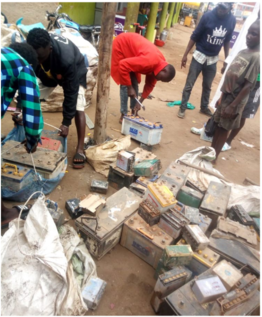Webinar Series on Understanding Ewaste Value Chain in Humanitarian Settings
This series of two webinars aims to shed light on the rising issue of e-waste in humanitarian settings as well as the complexity of e-waste management. The first webinar in the series will set the scene by introducing the challenge of e-waste management in the humanitarian context. The second webinar will then dive deeper and invite practitioners from different parts of the world to share their experiences in a panel discussion.
This webinar series is organized jointly by GIZ Energy Solutions for Displacement Settings program and GPA Coordination Unit.
Webinar 1: Understanding E-waste in Humanitarian Contexts
The first webinar in the series provides an introduction to the issue of e-waste in humanitarian contexts. A joint presentation by UNITAR/GPA and GIZ ESDS will capture the scale and complexity of the issue, along with introducing the e-waste value chain in the humanitarian context. A presentation by the University of Edinburgh will then focus on the technical aspects of e-waste management. This will be followed by a presentation from IOM on the E-waste Project in Bidi Bidi refugee camp in Uganda. The webinar will close with a Q&A with the audience.
Date/Time: 02 November at 14:00 CET (check your local time)
Registration link: https://register.gotowebinar.com/register/3499583208929416203
Presenters: Elif Demir, UNITAR/GPA; Lucas Kürten, GIZ ESDS; Jaime Cross, University of Edinburgh; Gemma Arthurson, IOM
Webinar Agenda
| Introduction to e-waste | Elif Demir, GPA/UNITAR
Lucas Kürten, GIZ ESDS |
| Technical input | Jaime Cross, University of Edinburgh |
| Overview of GOGLA's ongoing work on e-waste | Rebecca Rhodes, GOGLA |
| Case study from Uganda | Gemma Arthurson, IOM |
Second in the series, this webinar dives deeper into the policy landscape for e-waste management in displacement contexts. A detailed presentation on Extended Producer Responsibility (EPR) followed by a panel discussion on sharing concrete policy examples from the ground will be shared. Practitioners from different countries will also showcase their experiences and learnings, along with an open Q&A session with the audience.
Date/Time: 23 November, 14:00 CET (check your local time)
Registration link: https://attendee.gotowebinar.com/register/1303420882632900878
Webinar Agenda
| Summary of key takeaways from the first webinar | Elif Demir, GPA/UNITAR |
| Extended Producer Responsibility | CLASP |
| Panel Discussion | Abubaker Mayemba, IOM Uganda |
| UNHCR Bangladesh (tbc) | |
| Amadou Cisse, WFP Regional Bureau for Western Africa | |
| GIZ (tbc) |
Further Readings
- Humanitarian E-Waste Network: cross-organizational technical working group on E-waste Reduction in Displacement Settings.
- What is e-waste?
Publications/Resources from Displacement Settings
- GIZ Energy Solutions in Displacement Settings (ESDS) (2021). Baseline Assessment on Electronic Waste Management and Extended Producer Responsibility in Displacement Settings in Ethiopia, Kenya, Uganda
- GPA & NORCAP (2021). Electronic Waste (E-waste) Management for Off-grid Solar Solutions in Displacement Settings
- GIZ ESDS (2020). Solar E-Waste Reduction in Displacement Settings
- MEI (2019). Energy and Displacement in Eight Objects: Insights from Sub-Saharan Africa
- IOM: E-Waste Management Project in Uganda
Regulatory Framework
- E-waste Policy Handbook
- E-Waste Legislative Framework Map
- GOGLA's webinar on E-waste Policy and Regulation
- CLASP (2022): Bending Toward Circular: Using Extended Producer Responsibility Schemes to Transition to Appliance Circular Economy
- List of policy and regulatory framework for e-waste in Southern and East Africa.
- Regulatory framework for e-waste management in Ghana
Toolkits
- GOGLA: E-waste Toolkit and Business Blueprints for E-waste Management
- EEP Africa E-waste Toolkit
- ACE (2019). E-waste Policy Handbook
- GIZ (2019). E-Waste Training Manual
- Step Initiative. E-waste Business Plan Calculation Tool
- Innovation Norway. Innovation-friendly Procurement Tools for the Humanitarian Sector
- EforA. Practical Guidance for Designing & Implementing Field Testing for Appliances & Productive Use Equipment
- UN Global E-Waste Monitor
- Picosolar Repair Guide
Battery
- End-of-Life Management of Batteries in the Off-Grid Solar Sector
- Case study from Uganda and Senegal
- Sofies. Operational Guidelines for Handling Used Batteries in the Off-grid Solar Sector
- WEF (2021). Battery Value Chain in Africa
- Shell Foundation (2018). Energy Storage Trends for Off-grid Services in Emerging Markets
- Lead-Acid Battery Recycling in Africa
E-waste Management
- ITU (2022). Global and complementary actions for electronics extended producer responsibility
- Munro,P; Samrakoon, S. et.al. (2022). Towards a repair research agenda for off-grid solar e-waste in the Global South
- CDC (2021). How are Off-grid Solar Customers in Kenya Managing their Electronic Waste?
- ACE (2021). E-Waste Guide for Stand-Alone Solar in Nigeria
- Efficiency for Action (2021). Innovations and Lessons in Solar E-waste Management
- Rabaia, M, Abdelkareem, M. et.al (2021). Environmental Impacts of Solar Energy Systems: A Review
- ICRC (2021). Sustainable Management of ICRC’s Garage Waste
- Spear, Rowan, Cross, Jamie, Tait, Jeremy, Goyal, Richa., 2020. Pathway to Repair in the Global Off-grid Solar Sector
- EforA (2019). Solar E-Waste Management Best Practices for the Off-Grid Renewable Energy Sector Workshop Report
- CLASP (2019). Solar E-waste Market Scoping Report
- Environ. Sci. Technol. 2017, Life Cycle Assessment of Solar Photovoltaic Microgrid Systems in Off-Grid Communities
- DFID (2016). Case Studies from Nigeria, Kenya and Rwanda on e-waste Impact and Mitigation Options
- DFID (2016). Cost Benefit Analysis and Capacity Assessment for the Management of Electronic Waste (E-Waste) In the Off-grid Renewable Energy Sector in Kenya
- Duke University. Off-Grid Solar E-Waste: Impacts & Solutions in East Africa
- Off-grid solar waste in sub-Saharan Africa: Market dynamics, barriers to sustainability, and circular economy solutions
Other Resources
- StEP Initiative. https://www.step-initiative.org/index.html
- UNICEF (2020). A third of the world’s children poisoned by lead, new groundbreaking analysis says. https://www.unicef.org/rosa/press-releases/third-worlds-children-poisoned-lead-new-groundbreaking-analysis-says
- Platform for Accelerating the Circular Economy (PACE) & E-waste Coalition (2019). A New Circular Vision for Electronics: Time for a Global Reboot. https://www.weforum.org/reports/a-new-circular-vision-for-electronics-time-for-a-global-reboot




















